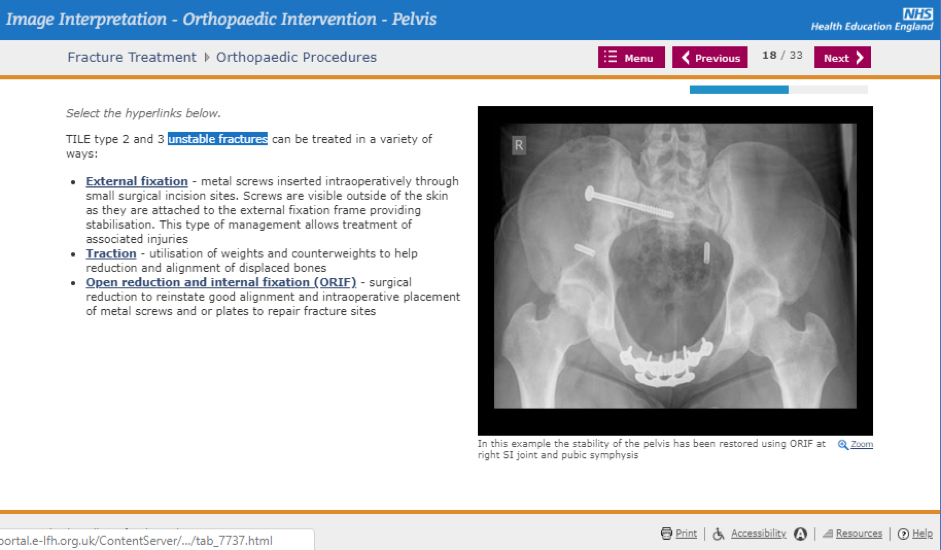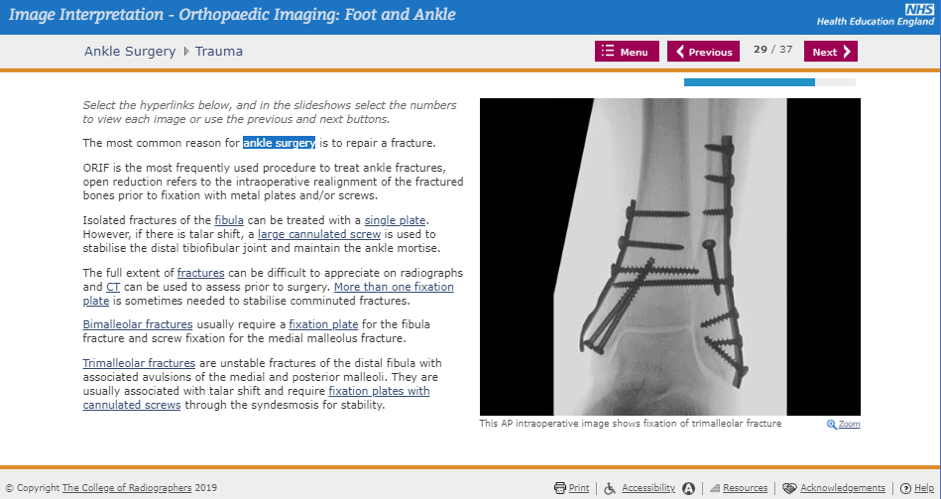Recently Health Education England’s elearning for healthcare (HEE elfh) added 10 new orthopaedic imaging sessions to the Image interpretation programme. In this blog we feature two of the content authors and ask them about their work and what is involved with creating sessions for the elearning programmes.
Can you tell us a bit about your role and your background?
Charlotte Ansell: Currently Site Superintendent Radiographer at Guy’s and St. Thomas’ NHS Foundation Trust. My role involves coordination of day-to-day running of the cross-site imaging departments and rotational staff. In addition, the role portfolio includes participating as a member of the reporting radiographer team.
Ben Pinnington: Currently Superintendent Radiographer at Guy’s and St. Thomas’ NHS Foundation Trust. My role involves day-to-day operational management of the general x-ray department which includes theatre, mobiles and fluoroscopy on the Guy’s site and participating as a member of the reporting radiographer team.
How and when did you first come across elearning for healthcare (elfh)?
Charlotte: I had previously authored paediatric focussed sessions in 2011 whilst working as the dedicated paediatric superintendent radiographer in Evelina London Children’s Hospital. I next encountered Dorothy Keane, Image Interpretation Clinical Lead, and made contact to see if there was an opportunity to become involved in the elfh project again.
How has elfh changed over the years?
The elfh Hub has grown massively, initially radiology focussed, and now covering a diverse range of topics and providing a wealth of information to many professions at all levels.
Have you used the material? In what way?
We have advertised and encouraged the use of the elfh hub through our Radiographer Education and Development forum which hosts monthly sessions to include presentations, debates and practical sessions.
What do you think of the Image Interpretation programme?
It’s a great online forum for radiographers of all levels to gain and consolidate their knowledge to support development and confidence in their clinical role.
Tell us about the Orthopaedic sessions you have written?
We have been involved in three sessions that have been produced; General Principles of Imaging in the Operating Theatre, Post-operative Pelvis and Post-operative Foot and Ankle. They each provide comprehensive content and include information and images to support users to increase their knowledge on the subject content.
The theatre session provides an overview of the equipment used, the theatre environment from a radiology perspective and takes the learner through multiple procedures from an equipment and imaging perspective. The post-op pelvis, foot and ankle sessions provide the learner with an overview of anatomy specific pathologies/injuries through imaging both pre- and post-operatively.
How will you use the sessions in your work?
We will encourage our peers and junior staff members to access the content via elfh.
How did you find the writing process?
Overall, we both enjoyed the opportunity to work on a different project whilst still highly relatable to our roles. The experience was challenging at times as we were required to succinctly articulate detailed information in single slides that enabled the user to meet the learning objectives set.
What were the challenges?
Perhaps most challenging was compiling a portfolio of images in theatre to demonstrate equipment and patient positioning for the imaging in the operating theatre session.
What surprised you about the process?
Initially, the topic titles seemed well defined but as soon as we started to discuss the content we realised that there was a lot more to be covered than first anticipated.
Do you have any advice for future authors?
If you have an opportunity to author sessions, we would encourage you to participate. Our advice would be to plan out the presentation before you start researching and constructing so that you have a clear vision of what you are compiling.
For more information about Health Education England’s elearning for healthcare Image Interpretation programme visit https://www.e-lfh.org.uk/programmes/image-interpretation/.





